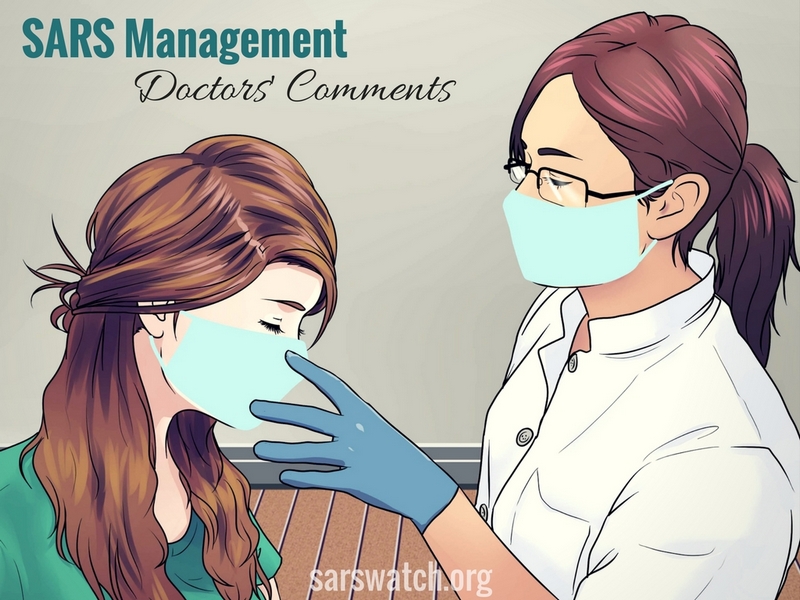Read the comments and recommendations of My Canadian Pharmacy specialists on SARS diagnosis and prevention.
Diagnosis of SARS
Preliminary diagnosis – clinical and epidemiological.
-
The reference diagnostic criteria are as follows:
– fever and symptoms of intoxication;
– symptoms of respiratory syndrome with an increase in their intensity;
– stay in SIDS-endemic regions and countries for 10 days before the disease. -
The doctor uses the following paraclinical and instrumental data to diagnose SARS:
– in the general analysis of blood – thrombocytopenia, lymphopenia, in biochemical analysis – change in hepatic enzymes;
– Radiography of the lungs – changes may appear already in the first week of the disease – on average on the 3-4th day of the disease, bilateral infiltrative changes appear in the lungs, which spread to the entire lung tissue with the corresponding reaction of the lungs and possible displacement of the cardiac shadow.
The final diagnosis is made after the laboratory confirmation.
- Molecular diagnostic methods allow to identify the virus in the early stages of the disease. The material for research: blood, secrets of the upper and lower respiratory tract, bowel movements, fluids of different tissues of the patient;
- Serological tests (immunofluorescence method). The material for the study: patient’s blood serum. The ELISA reaction becomes positive from the 21st day of the disease, and the immunofluorescence method – from the 10th day of the disease, therefore, they can not be used for early diagnosis;
- Virological research methods allow to isolate a virus grown in a cell culture. The material for the study: blood, bowel movements and secrets of the respiratory tract;
- An express test for the diagnosis of SARS with materials for examination: sputum smear, nasal and pharyngeal mucosa, feces, urine, blood. The result is ready in 4 hours. The test can be conducted at any stage of the disease.
When to visit a doctor
If a person has just returned from a trip to Asia or has been in close contact with someone who was in countries where there is a high incidence of SARS, My Canadian Pharmacy recommends that you pay special attention to your own health for at least 10 days. It is necessary to consult a doctor, if during this time you have cough and fever. It is not known whether a SARS virus infection can be caught from a person who does not yet have severe symptoms of the disease. That is why experts consider it is necessary to monitor those people who have not yet fallen ill but have risk factors.
Prophylaxis of SARS
If there are SARS patients at home, you should take the following precautions:
- Frequent washing of hands with soap and hot water or using hand wipes with alcohol solution;
- You should avoid touching your face with your hands, if necessary, wipe your eyes or nose with disposable wipes;
- Use disposable gloves if there is contact with body fluids or feces of SARS patients. After use, immediately discard gloves and wash hands thoroughly;
- Use surgical masks when you contact with a SARS patient. Glasses can also provide some protection;
- Use soap and hot water for processing utensils, towels, bed linen and clothes of SARS patients. Do not use these items until they are properly handled.
Consult a doctor immediately when you experience fever or respiratory symptoms occur and tell him about your contact with a SARS patient.
WHO recommendations for airport personnel taking passengers from endemic areas:
- Is there a temperature at the arrival?
- Does the arriving person have symptoms of SARS in the last 48 hours?
- Did the person who arrived had contact with a SARS patient in an endemic area?
Suspicious people with affirmative answers are sent for consultation and / or hospitalization in the infectious department.
A suspected SARS patient is given a protective mask, the ship’s commander informs the arrival airport about this patient, the arriving person is isolated to the infectious disease department.
WHO recommendations for dealing with patients who are SARS suspicious:
- all contact people are rewritten in a separate list;
- contact people are observed for 14 days;
- when symptoms of the disease appear within 10 days, urgent medical treatment is required.
Specific prevention is not developed.
Protecting others
If you are diagnosed with SARS, you should take the following measures to secure other people:
- Often wash your hands with soap and hot water or use hand-wipes with alcohol solution;
- Cover your mouth and nose with a tissue when you cough or sneeze and, if possible, wear a surgical mask when dealing with other people;
- Do not use your dishes, towels, bed linens together with other people until these items are carefully processed;
- Do not attend school, work and other public places for 10 days after you got rid of SARS symptoms.
Travel safety
CDC and WHO are strongly recommend avoiding travel to regions where SARS is widespread.
When returning from a region with a high risk of infection on the plane, each passenger receives a special “alarming” card on landing, according to which he must be observed by the doctor within the next 10 days. You should immediately consult a doctor immediately if a person is sick during a trip or flight or is sick after returning.
Some experts believe that the infection in airplanes is spreading through the openings of the air conditioning system located directly above the passenger seat. Therefore, during the flight the ventilation should be turned off.

